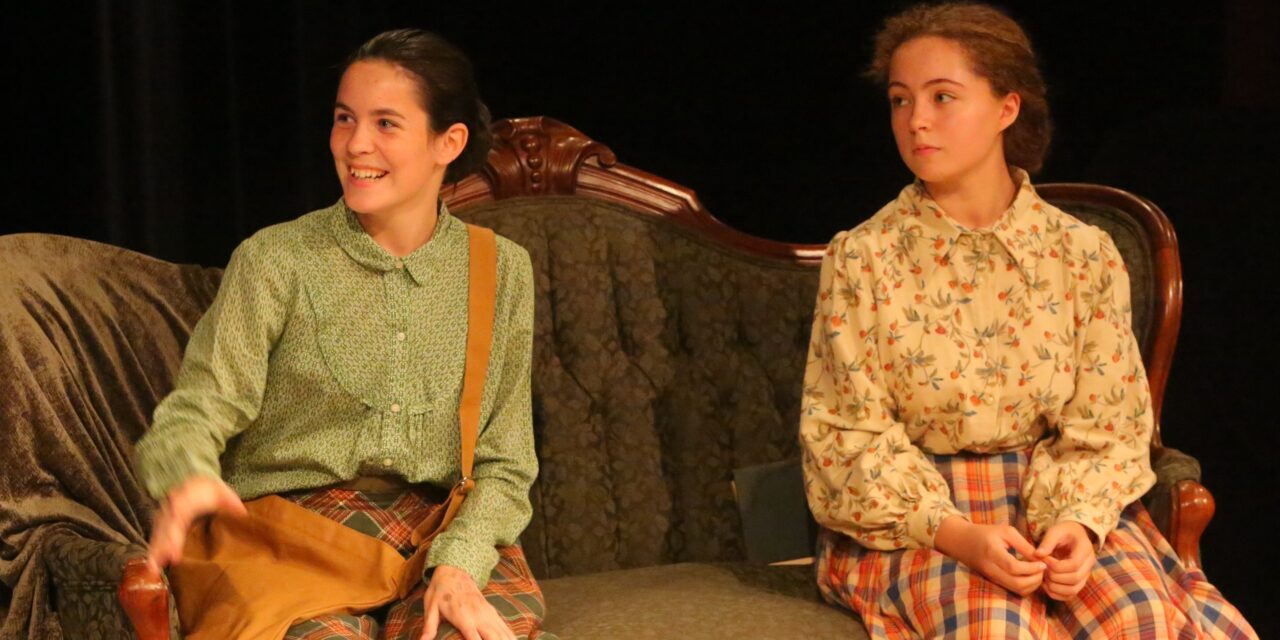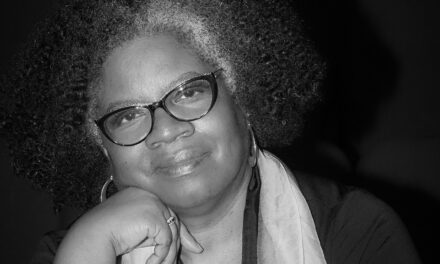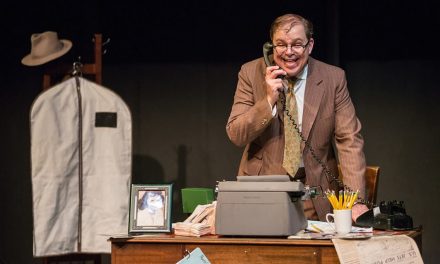Sam Payne-Young & Madison Janosek in Little Women. Photo: CTC
Little Women
By Kate Hamill
Adapted from the book by Louisa May Alcott
Directed by Tessa McShane
A review by Keith Waits
Entire contents are copyright © 2023 by Keith Waits. All rights reserved.
Classic stories such as Emma, Sense and Sensibility, and Vanity Fair have been on the stage in various adaptations for generations, but sometimes those adaptations can seem musty and outdated. Kate Hamill has taken it upon herself to invigorate these venerable stories with a modern, feminist sensibility that speaks to contemporary audiences. Of late, Louisville has been treated to her Pride and Prejudice through Kentucky Shakespeare, and the second run of her Dracula, a Feminist Revenge Fantasy just closed at Actors Theatre of Louisville.
Little Women is traditionally viewed as a feminist piece, a story about a storyteller who refuses to conform to the demands mid-18th century America made on women. Jo is one of four March sisters and the rebellious one. Meg is the oldest and most sensible, Amy the youngest and somewhat frivolous, and Beth the most vulnerable. Their father is fighting with the Federal army in the Civil War, leaving the mother, Marmee, and Housekeeper Hannah to manage things.
Wealthy next-door neighbor Mr. Laurence and his grandson, Theodore “Laurie” Laurence, become involved in the March as friend and protector, and the friendship between Jo and Laurie grows close enough to court the inevitability of romance.
That Louisa May Alcott doesn’t give in to that inevitability is arguably the key feminist credential but after intermission, Hamill pushes her messaging to the forefront in three scenes in particular. Jo explodes at her Aunt March’s unrepentant racist isolationism with a retort full of contemporary sensibility; Amy unloads on Jo about the difficulties of marriage and motherhood, a near breakdown that would play as easily in the 1960s; and Jo’s dismissal by a male publisher that is a textbook exercise in patriarchal condescension.
Director Tessa McShane understands all of this. It’s a smart script that only demands to be played straight in period and manner. If anything, Hamill has already put quotation marks around her messaging in the structure. Just get out of the way and let it play out.
The pacing does well by the humor in the play, but Hamill has included several small moments that could have used a little more room to breathe. This Little Women is very funny and not at all short of charm but it misses some of the pathos.
A student cast like this can provide a range of stage experience, and nine years in the classroom and on the stage is not atypical. Sam Payne-Young (7 years at CTC) is well-cast as Jo: tomboy enough but also with the heart of the restless poet, Payne-Young’s energy drives the production. Millie Arndt (4 years) is an appropriately self-obsessed Amy, coquettish with a streak of sass and sure comic timing but also the good sense to know when to stand still. Addison Jones is a solid Meg, who marries and starts a family, but she makes the most of her big moment exposing the stress and suffering of being a “good wife”, and finding the full implications of the play’s intentions. Madison Janosek might have the least experience – the program doesn’t specify her years at CTC – and she doesn’t overcome her awkwardness onstage. Yet she has a doleful countenance and haunted eyes that compellingly carry a lot of what Beth requires.
The rest of the ensemble does good work, but, aside from Nathan Bukowski’s steadfast and true Laurie, Hamill keeps the focus on the sisters and doesn’t allow a lot of space for the development of the other characters. There is a lot more to Aunt March than the trigger for Jo’s rant that she is reduced to here, and that may be the most questionable aspect of Hamill’s approach here, that she is paring down the emotional complexity of the story in favor of easily identifiable stereotypes.
McShane does what she can with the many scene changes, but the episodic structure is challenging, however much Civil War period piano music is employed. Hamill also drops much of the later action that is usually found in other adaptations; most significantly Jo’s developing career as a writer.
It’s a good-looking show, with costumes by Lindsay Chamberlin, lights and sound by Jake Allen Miller, and set pieces and properties by Gerry Kean and Hannah Brooks Green, respectively.
Little Women is a classic story that easily relates to contemporary audiences at any point in history. Popular film versions arrive every 10-20 years, most recently Barbie director Greta Gerwig’s deeply satisfying adaptation in 2019. Hamill is in line with the more overt feminist statement of that movie, but I cannot help but feel that she shortchanges the story a little. Still, she is faithful enough to be welcome among Louisa May Alcott fans and newcomers to the story of the March Sisters.
Now, who in town is up for doing Hamill’s Ms. Holmes & Ms. Watson – Apt. 2B?
Featuring Millie Arndt, Crumb Arnold, Nathan Bukowski, Madison Janosek, Addison Jones, Ella Kozoli, Sam Payne-Young, Duncan Scalf, & Lore Rodriguez
Little Women
September 28, 29, & 30 @ 7:30 pm
October 1 @ 2:00 pmCommonwealth Theatre Center
1123 Payne Street
Louisville, KY 40204
ctclou.org
Keith Waits is a native of Louisville who works at Louisville Visual Art during the days, including being the host of Artists Talk with LVA on WXOX 97.1 FM / ARTxFM.com, but spends most of his evenings indulging his taste for theatre, music and visual arts. His work has appeared in LEO Weekly, Pure Uncut Candy, TheatreLouisville, and Louisville Mojo. He is now Managing Editor for Arts-Louisville.com.





